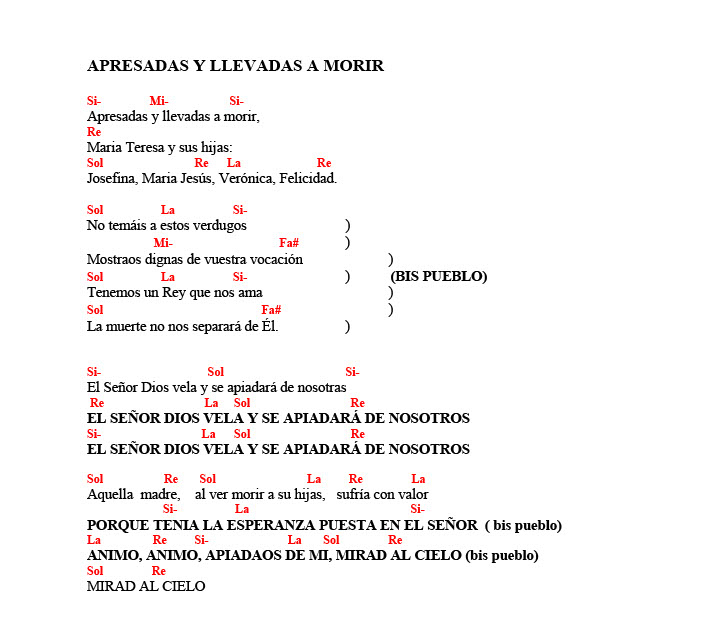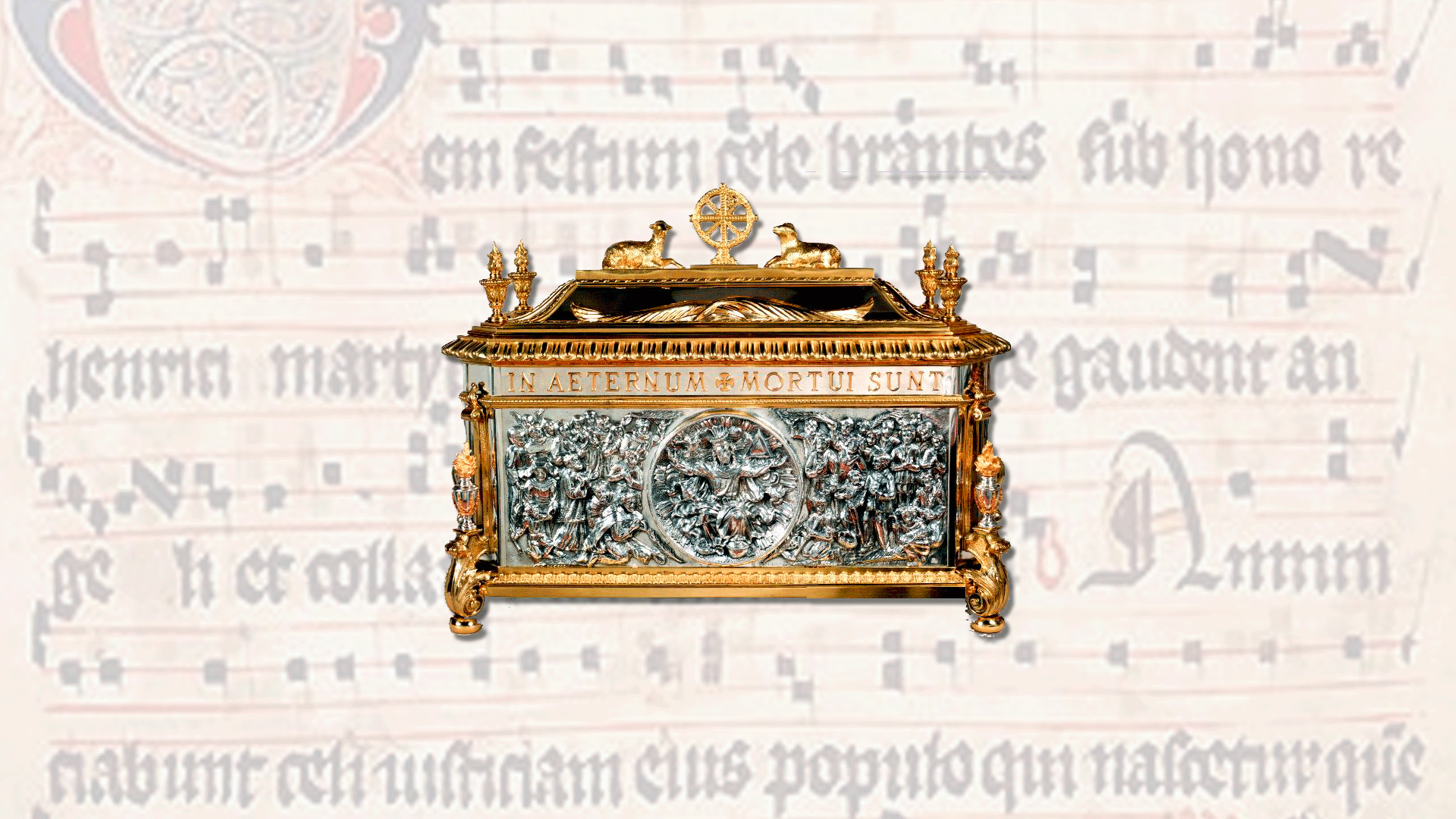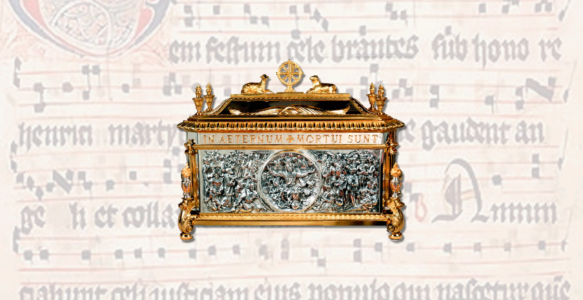“Captured and Taken to Die”
Canticle of María Teresa and her Blessed Martyr Daughters of San Pio X Parish (Algemesí, Spain)
Captured (1) and Taken to Die
María Teresa and her daughters:
Josefina, María Jesús, Verónica, Felicidad
Do not fear these executioners
show yourselves worthy of your vocation
we have a King who loves us
death will not separate us from Him.
Do not fear these executioners (2)
show yourselves worthy of your vocation
We have a King who loves us
death will not separate us from Him.
The Lord God watches over us and will have compassion on us (3)
The Lord God watches over us and will have mercy on us
The Lord God watches over us and will have mercy on us
That mother (4), seeing her daughters die.
suffered bravely
For she placed her hope in the Lord
For she placed her hope in the Lord
Courage!, Courage!. Have mercy on me…, look to heaven (5)
Courage!, Courage!. Have mercy on me…, look to heaven
Look to heaven
Canticle based on “The Martyrdom of the Seven Brothers”
2º Book of Maccabees, Chapter 7 (1) 2 Mcb 7,1 (2) 2 Mcb 7,29 (3) 2 Mcb 7,6 (4) 2 Mcb 7,20b (5) 2 Mcb 7,28 When in bold THE PEOPLE SING

History Of the Song
After the beatification of the martyrs of San Pio X Parish in Algemesí (Valencia) in 2001, many faithful in the parish requested to be able to sing a hymn in their honour. The parish priest, José Luis Cuesta, consulted with various parishioners who could collaborate on the idea. Initially, a set of lyrics emerged, to which two psalmists from the parish set music, composing a first hymn that is still waiting to be sung.
In the summer of 2003, a diocesan priest on a mission, originally from the parish, joined these two psalmists. He brought the spirit of evangelisation and suggested using the martyrdom of the Maccabees and their mother as a model, since this model had been emphasised by Pope Pius XII upon learning of the account of the martyrdom of the Masiá family. They decided to compose a new hymn based on this new proposal and to see which of the two truly emerged with greater strength in terms of music, lyrics, etc.
For about a dozen sessions, the three individuals met to compose a text based on the biblical passage of the Maccabees and the critical moments of the martyrdom of these nuns and their mother, where the music could elevate each of the chosen phrases. In these sessions of musical creation and selection of the content of the song, they discussed how those moments were, what they meant for both the nuns and their mother during the moments leading up to the events, the imprisonment, and especially the psychological extortion they were subjected to in an attempt to strip them of their identity and renounce their dignity.
It was impressive how a parallel emerged between the experiences of the Maccabees, who refused to submit and lose their identity in relation to Nebuchadnezzar, and the moments lived by these martyrs. Furthermore, from an existential point of view, seeing God’s love in the history of people, and from the personal experience of Christ of those who were there creating this song, the key phrases of the song were oriented towards faith, hope, and love for God above all, even above one’s own life, akin to these martyrs who gave their lives out of love for Christ.
There was always progress in both the selection of the text and the music by consensus among the three members of the creative group, a sign of communion and based on the inspiration of any of the three, all of whom had extensive experience in the chanting of hymns, psalms, and inspired songs.
In one of the sessions, at the house where these three individuals gathered, as they sang the song in its final phase, it resonated in the neighbouring houses, where the neighbours wondered what such a beautiful song was being sung. Throughout the process, it was evident how easily phrases and musical tones emerged to emphasize the importance and complete the song. The order of the lyrics, the different verses of the song, and the catechetical message of each were also developed. This group presented the song during a solemn vespers in the parish on the feast day of the martyrs.
During the main celebrations in parish life, the song was sung, and in the
various parish communities, it also began to be used as a prayer to
reach the hearts of the faithful through the lives of these martyrs. Finally, it was presented to the entire archpriest community of Algemesí on the day of the procession of the martyrs’ remains to the new parish of San Pío X. In this grand ceremony, which began at the Basilica of San Jaime Apóstol, the song was rehearsed during the welcome of the faithful, religious men and women, especially from the order of the Capuchin Nuns (from Alicante). It was proclaimed and sung during the vespers celebration that marked the beginning of the transfer.
The anonymity of the individuals who formed this group to compose the song has been preserved, allowing it to be given to the parish community without any personal recognition, so that it is the community that, in gratitude for the blood shed by these martyrs, offers this hymn.
The Catechetical Message of these Martyrs
Let’s take a look at the parts of this song:
“Captured and Taken to Die”
This title summarises the historical moment and the event, which represents not death but eternal life for a Christian when the moment of martyrdom arrives. It is a song based on the martyrdom of the Maccabees, where their mother encourages them in that moment of suffering, just as Teresa of Ávila did, who did not allow her daughters to be left alone and accompanied them by saying that wherever her daughters went, she would go. Here is Teresa, as a new mother to the Maccabees, exhorting in this song: ‘Do not fear…’
“Maria Teresa and her Daughters: Josefina, Maria Jesús, Verónica and Felicidad”.
In this song, each of their names is recited. Because a name is the most important thing for a person, and when we love someone, we call them by their name. It is what a person likes to hear the most, to have good things said about them, to have their name spoken. God also calls each of His chosen ones by name, like Abraham and Moses, and creates an impressive story with them.
“Do not fear these executioners, show yourselves worthy of your vocation”.
The mother, the new mother of the Maccabees, speaks, encouraging and strengthening in moments of suffering. The dignity of the Christian vocation is presented here at a moment when faith is tested; this entails a profound sense of firmness in the face of death. Being worthy, for us as Christians, represents a set of things, from the way we speak, dress, and act, etc. This dignity to which we are called will be put to the test.
“We have a King that loves us”.
Before King Nebuchadnezzar, who demanded submission and to be served, there appears a King who serves and gives Himself, Christ, who gave His life for us and showed the way of love: to give one’s life.
“Death will not separate us from Him”
This is the faith that saves. And in the moment of death, they do not resist evil. That is why it is more important to be with God than to cling to one’s own life. Because death and the fear of dying keep us subjected to lifelong slavery, meaning we do not live in the freedom of the children of God.
“The Lord God watches over us and will have mercy of us, The Lord God watches over us and will have mercy of us, The Lord God watches over us and will have mercy of us.”
The first phrase sung softly suggests something known to very few people. Certainly, only Christians know that God watches over suffering, deprivation, persecution, etc. In the following phrases, we sing ‘we’ because we associate with the suffering of the martyrs. The tone rises, sung louder, as a sign that the mission of the Christian is to proclaim it as loudly as possible, just as a lamp is placed high in the house, not under the table.
“That mother, seeing her daughters die, suffered bravely, for she placed her hope in the Lord”
It is only possible to suffer bravely if one has a certain hope.
“Courage, Courage, have mercy on me, look to heaven”
‘Courage,’ like ‘soul’ in Valencian, animates the place where God speaks to us. To take courage means to have life, to have a soul. She asks them to have compassion on her, so that all the faith transmitted is not rendered useless. Like Saint Stephen, the first martyr who looked to heaven, this vision also reveals the destination: eternal life.”

Catechesis on the Song’s presentation – November 2003 -Vicente Egea-
I had to present the figures of these martyrs: Maria Teresa, Josefa, María Jesús, Verónica, and Felicidad. I hope that these sisters of ours may truly be close to our lives. It is no coincidence that they are in this parish, nor is it a coincidence that this parish has felt a call from the very beginning to live in community, to remain faithful to the Church, in a large family, open to life, like this family. This family is similar: a couple with nine children, one of whom is a religious sister, two of whom died young, followed by the four religious sisters, then the mother of Don Juan, and Father Serafín (the only son, a Capuchin friar). There is a closeness that touches our hearts, knowing that they are near to us.
In this presentation, what I do not wish to do is tell a story. There is already a book that recounts it. I simply want to express to you what the miracle of life is. I remember the day they exhumed the boxes containing the remains, which were in the parish. It was an evidence of a joyful celebration, a celebration that was in heaven. There was no death there; life resided there, and in fact, the postulator said, ‘This is a celebration of life, and of eternal life.’
Because our life has meaning when eternal life appears. You can give birth to children for eternal life, and you can lose your life because eternal life is at stake. If not, we are aborting the faith. We are making it ‘useless,’ so to speak, that strength poured out only out of love, only by grace, because they are incredible, and it moves one to see what faith is capable of—the power to believe, the ability to feel like children of God. The ability to see yourself close to Jesus in your life, even if you are a wreck, no matter what you are, even if you are desperate, even if you do not believe in many moments of your existence for being weak and sinful. Just as we are, there the glory of God and the cross appear. Jesus Christ is able to give Himself and lay down His life, to face death head-on, to look at death as a victory, as in the moment of martyrdom when the mother says to her daughters: ‘This is a moment; heaven is forever.’ Saint Teresa said: ‘This life is a bad night in a bad inn’.
Well, this mother, María Teresa, was very interested in having her children born and raised within the Church. It was said of her:
… her mother, fearful of God and aware of the important mission of forming the family in the Christian faith, personally took them to the school of perfection of Josefa Naval Girbés, known as ‘Señora Pepa,’ whose teachings she loved to hear and whose spirit she wanted for herself and her daughters.
She was already taking them… just as you are called to carry the holiness of God, not your own. For you are imperfect, a sinner, weak, messing up every day, having harsh words that come out, not being able to stay silent, not being able to love our children, not being able to forgive our parents, filled with reproaches. With the light of the Holy Spirit that you and I have received, our children are growing under the shadow of this cross and under the protection of these martyrs, within their Church. Because we must know one thing: that at the thresholds of the Church, even if you are a wreck, you can live, you can live. Right now, those of us here would be outside, destroying one another because we are like this. Well, the joy is being able to see this.
This holy woman lived everything under the word of God, just as you and I have it. A word of God that is close, that corrects us, reprimands us, teaches us, educates us, uplifts us, and makes us feel like children of God. And this is the experience of these martyrs; that is their wealth: they have discovered a love, they have discovered the eternal life that exists. And that is what we are called to, to enjoy it. How? In a very simple way: like this holy woman, by living close to the Church, by fulfilling the mission that every Christian is called to, to be a servant to others.
And that is why, on this night, it is important to talk about life in the parish. None of us should remain idle; we should all be actively working, willingly giving our lives in catechesis, in evangelization, in visiting the sick, in Caritas, helping Father Amadeo with the ‘Alleluia’ sheet, in whatever it may be, with joy and happiness. This way, we can help those whose faith is weaker than ours; those who, like any believer, if you don’t help them up four steps, won’t be able to hear the word of God. If you serve it to them, if you help them, you are living and desiring Jesus, who is the only love, just like they did. The only love that is resurrected is that of Jesus. Not that of man to woman, nor that of woman to man, nor that of children to parents: the only love that is resurrected and makes you look to heaven as they did is this love; there is no other. To be able to enter into that, to see that having faith is not monstrous.
I just want to say one specific word that I have been taught. How does a mother see her four daughters born of her womb and is able to tell them from faith: ‘Do not fear, my daughters,’ she says encouraging them, ‘this is just a matter of a moment, and soon we will be in heaven?’ That is why we can sing, enjoying what has been given to us. And in the martyrdom of everyday life, like her; what do you think, being pregnant and having to go with the children… is that not a martyrdom? And their father… what would they say about them?
This should inspire us to say to the Lord: ‘Here I am, Lord, to fulfill your will’.


